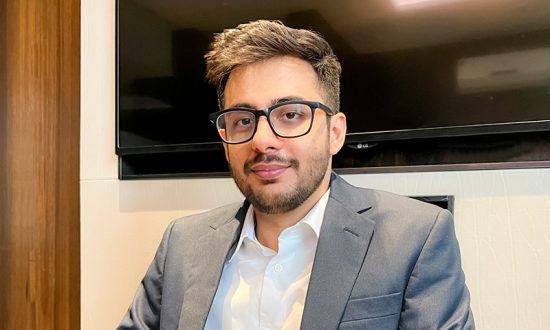Lavin Mirchandani is the Co-founder of ConnectEd Technologies, which is an edtech social enterprise that specializes in creating tailor-made technologies and deploying large-scale developmental programs that make quality education accessible to government schools and the children studying therein. For the company, he leads Content Development and Finance, which are two critical functions that lead any edtech enterprise towards a sustainable business model. In a situation where the edtech industry in India is plagued by companies that have raised immense capital to achieve scale, but remain largely unviable, Mr. Lavin Mirchandani has been able to leverage his past experience in the finance industry to build a commercially viable business model for the company from the first year of business itself.
When the Covid-19 pandemic first hit India in 2020, schools all over the country were the first to be ordered shut by the Centre. While it was relatively convenient for teachers and students from private schools to migrate to online education, those depending on government schools suffered greatly. To ease the pressure on students and their parents, the Centre ordered all State Boards to reduce the prescribed syllabus and relax the examination guidelines. The move offered relief to students, parents and teachers associated with government schools. However, it was only a temporary solution for a long-term problem.
Through online education, private school stakeholders were meeting their academic goals effectively. Hence, the Centre and the State governments advised government school teachers to use WhatsApp and other such platforms to circulate educational material to keep their students engaged. With the realization that private school students had already migrated to online learning, government school teachers encouraged their students to switch to online learning with the help of smartphones, computers and internet connectivity. However, not all students dependent on public education had access to the required infrastructure or the means to acquire it.
The inability of all government school students to switch to online education led most State Governments to allow physical lectures for students in grades 9th and above by January 2021. However, the joy of learning in person, amidst the company of peers, was short-lived as a new variant of the virus – Delta – caused a second wave of Covid-19, resulting in the discontinuation of physical classes nationwide by April 2021. Again, those with access to requisite devices and internet connectivity returned to online learning, whereas the less fortunate were cut off from education until India reopened schools after the second wave.
By the time State Governments across India allowed schools to restart physical lectures across all Grades, it was December 2021 and a third variant of Covid-19 – named ‘Omicron’ – had just surfaced in African countries. As schools across the country took a break for their annual year-end holidays, there was a fresh surge in Covid-19 cases across, thanks to the emergence and rapid spread of the Omicron variant in India. In response, as of today, most State Governments have declared school closure for students till Grade 5, with a sizable number imposing such curbs for students till Grade 8, and some even declaring a complete shutdown of schools for all students.
As students with access to devices and connectivity go back to learning online for the third time, and those without it get disconnected from education yet again, the government seems determined to put an end to Covid-19’s onslaught on the academic paths of Indian students. On 3rd January 2022, the Central Government initiated its Covid-19 vaccination drive for teenagers in the age bracket of 15-18, which essentially covers students between Grade 9 to 12 – a formative, but crucial phase in anyone’s academic journey. As of 5th January, State Governments across the country had successfully administered first dose of the vaccine to 1.18 crore students from an estimated 7.4 crore students in this category.
The government sees to be following a two-way approach to strengthen the education system against future Covid-19 attacks. The government has begun vaccinating students between the ages of 15 and 18 before their board examinations. The vaccine is likely to reach younger students before the academic year 2022-23. Moreover, multiple State Governments have announced free or subsidized devices and internet connectivity to government school students, particularly those in grades 9 to 12. The Centre is also building a repository of educational content in various regional languages for public school students.
Bearing in mind that the Omicron variant showcases milder symptoms in its hosts and spreads faster amongst people than previous strains of Covid-19, one can expect the third wave of this pandemic to run a lot longer than its predecessors. As a result, even though the government has started vaccinating students rapidly, one can expect schools to be closed for physical lectures for the next few months, which will affect annual examinations for the academic year 2021-2022. More strains are emerging in different parts of the world, and it is a matter of serious concern as it can cast shadows over the next academic year too.
Nobody can say with utmost certainty how this academic year, or even the next one, will unfold. However, as someone whose organization has been closely involved in creating vernacular EdTech solutions for government school students for the past 6 years, I can say with great conviction that structural reforms made by the government due to this pandemic will usher in an era of technology-enabled blended learning for government schools which, in turn, will exponentially improve the quality of education provided to their students, thereby enabling future generations of this country to contribute to the India growth story in a much bigger way than ever before.




